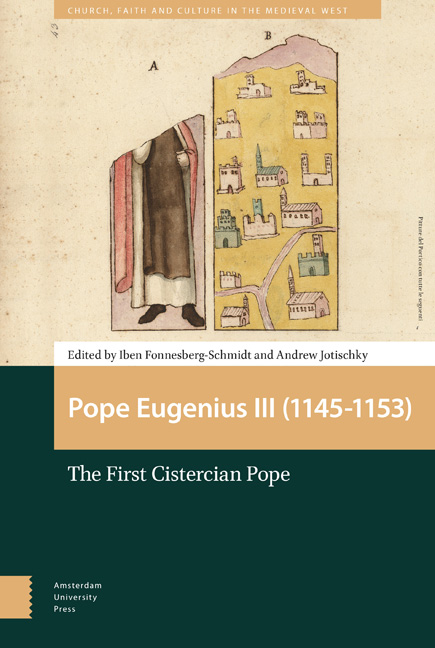Book contents
- Frontmatter
- Contents
- Preface
- Abbreviations
- Maps and Figures
- Introduction
- 1 ‘Justinian’s Laws, not the Lord’s’: Eugenius III and the Learned laws
- 2 Curial Politics and Papal Power : Eugenius III, the Curia, and Contemporary Theological Controversy
- 3 The Cistercians, Eugenius III, and the Disputed York Election
- 4 Eugenius III and the Crusades to the East
- 5 Eugenius III and the Northern Crusade
- 6 The Benefits of Exile
- 7 Eugenius III and France: the Protected Protector
- 8 A Golden Rose and the Deaf Asp that Stoppeth her Ears: Eugenius III and Spain
- 9 Eugenius III and the Roman Commune
- 10 Eugenius III Reclaims the Patrimony of St Peter
- 11 Eugenius III’s Privileges to Cistercian Houses
- 12 Eugenius III at Cîteaux, 1147
- 13 Eugenius III and the Church in the Crusader States
- Index
2 - Curial Politics and Papal Power : Eugenius III, the Curia, and Contemporary Theological Controversy
Published online by Cambridge University Press: 22 December 2020
- Frontmatter
- Contents
- Preface
- Abbreviations
- Maps and Figures
- Introduction
- 1 ‘Justinian’s Laws, not the Lord’s’: Eugenius III and the Learned laws
- 2 Curial Politics and Papal Power : Eugenius III, the Curia, and Contemporary Theological Controversy
- 3 The Cistercians, Eugenius III, and the Disputed York Election
- 4 Eugenius III and the Crusades to the East
- 5 Eugenius III and the Northern Crusade
- 6 The Benefits of Exile
- 7 Eugenius III and France: the Protected Protector
- 8 A Golden Rose and the Deaf Asp that Stoppeth her Ears: Eugenius III and Spain
- 9 Eugenius III and the Roman Commune
- 10 Eugenius III Reclaims the Patrimony of St Peter
- 11 Eugenius III’s Privileges to Cistercian Houses
- 12 Eugenius III at Cîteaux, 1147
- 13 Eugenius III and the Church in the Crusader States
- Index
Summary
Abstract
Elected while his mentor, Bernard of Clairvaux, was still alive, Eugenius III oversaw the papacy's transformation from a primarily spiritual into an administrative institution and the Curia as a place where scholars like Robert Pullen, Bernard of Morlas, Bernard Silvestris, Hildegard of Bingen, Anselm of Havelberg, Burgundio of Pisa, Arnold of Brescia and Gerhoch of Reichersberg could approach the pope. One of the most prominent doctrinal conflicts of the twelfth century, the trial of Bishop Gilbert of Poitiers at Reims in 1148, reveals the inner workings of the Curia. And finally, what was Bernard's role during Eugenius III's pontificate? How did the cardinals react to his unrelenting lobbying, and did Eugenius finally manage to emancipate himself from his mentor's influence?
Keywords: papal Curia; cardinals; early scholastic theology; Gilbert of Poitiers; Bernard of Clairvaux
In contrast with other twelfth-century popes Eugenius III was not an outstanding intellectual. Quite the opposite, if we follow the rather ambiguous characteristics assigned to Eugenius by Boso in his continuation of the Liber pontificalis. According to some, Boso writes, there were doubts whether the abbot of S. Anastasio would be capable of shouldering the burden of the papal office. However, divine grace had unexpectedly conferred upon him so much erudition, eloquence, sense of justice, and polished manners that he outdid many of his predecessors. Immediately after the election Bernard of Clairvaux wrote a letter in which he criticized the cardinals for having elected a monk, thus tearing him away from the contemplative life. Bernard certainly had an intimate knowledge of the character of the former Clairvaux monk and future pope and described him as somebody living the life of a farmer (homo rusticanus), used to working with axe and hoe. The expression homo rusticanus when used with respect to a way of life or to intellectual abilities is rather deprecatory. But this of course is not the meaning intended by Bernard. Rather, he meant to signify that the pope and former monk was well adapted to the monastic life, which is characterized by intellectual and formal simplicity – as opposed to the refined style of life and social interaction in the papal Curia with its intrigues and corruption, power play and political deal making.
- Type
- Chapter
- Information
- Pope Eugenius III (1145–1153)The First Cistercian Pope, pp. 69 - 100Publisher: Amsterdam University PressPrint publication year: 2018



